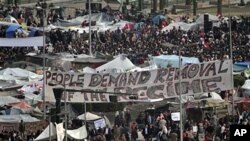Egypt's newly appointed Cabinet has decided to raise the salaries of government employees by 15 percent, the latest government action in attempts to quell anger from protesters calling for the ouster of President Hosni Mubarak.
The Cabinet agreed on the step Monday during its first full meeting since the uprising began two weeks ago.
Thousands of Egyptian opposition activists are occupying Cairo's Tahrir Square for a 14th day. Some protesters have planted tents in the square, vowing to remain until Mr. Mubarak quits the post he has held for almost 30 years.
On Sunday, Vice President Omar Suleiman held unprecedented talks with Egyptian opposition groups supporting the largely student-led protests.
The groups say the government has failed to satisfy their core demand for Mr. Mubarak's immediate resignation. They said concessions offered to them in Sunday's meeting were not sufficient, but represent a first step in a dialogue.
It was not clear when the government and opposition representatives will meet again.
The Egyptian government says Suleiman agreed to set up a committee of judicial and political figures to study constitutional reforms that would allow more candidates to run for the presidency. It says the committee will be required to complete the study by the first week of March.
Suleiman also offered to ease restrictions on press freedom and to lift a deeply unpopular emergency law when the security situation permits. Mr. Mubarak introduced the law on taking office in 1981. It gives Egyptian security forces far-reaching powers to detain people perceived as threats to the state.
The talks were the first known discussions in years between the Egyptian government and the Muslim Brotherhood. The group is banned from operating publicly, but its members have served in parliament as independents.
Cairo's Tahrir Square has been the focal point of the anti-Mubarak uprising that has seen hundreds of thousands of people take to the streets of major cities since January 25th. Battles broke out in the square last week between opponents and supporters of Mr. Mubarak. The United Nations says protest-related violence in Egypt has killed more than 300 people.
Mr. Mubarak has responded to the protests by pledging not to seek a sixth term in a September presidential election, while the government has said that the president's son also will not seek the post.
Mubarak Timeline












